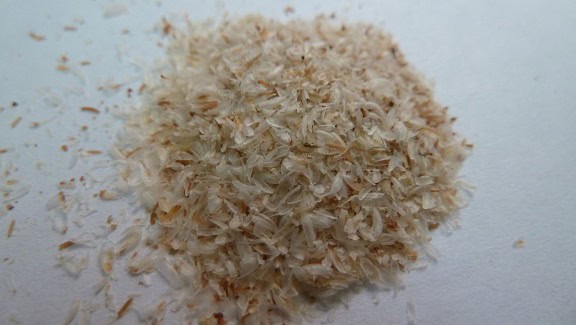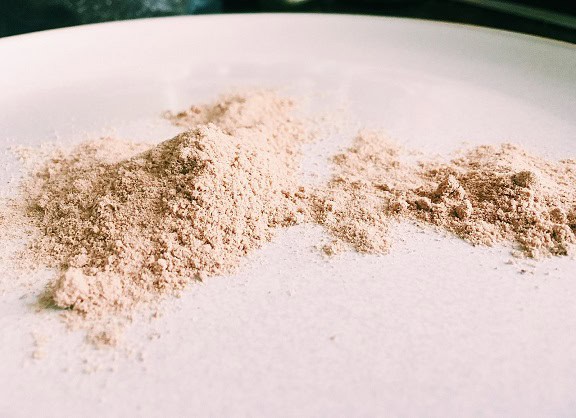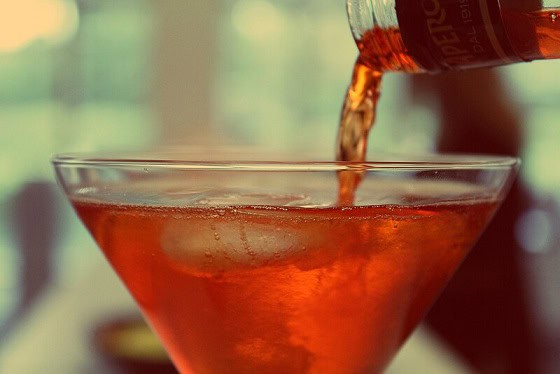
Psyllium husk is a character you may have encountered occasionally during your journeys through the acne underground. It isn’t as easy to come across as zinc or vitamin E, yet it likes to emerge from the shadows at random times, and offer certain chosen people the chance of gloriously clear skin.
The testimonials for psyllium husk are surprisingly good, whether it’s on modern day social media like reddit, or 17 year old posts on mostly dead internet forums like acne.org. People report not tighter skin, not more glowing skin, not younger skin, but a straightforward reduction in acne.
However, a common tale is benefits that take several weeks to manifest, and judging by the evidence, this is bang on the money. Psyllium husk will fail miserably for many acne patients, but could be excellent in certain circumstances.
An ancient digestion booster
Psyllium supplements are a food-style powder made from various plants in the Plantago family, most commonly the Mediterranean species Plantago ovata.
Psyllium isn’t like a sunflower seed where back-breaking effort or hyper-advanced machinery is required to squeeze just one millilitre of oil out. Each psyllium plant can produce 15,000 seeds, which are said to be in the shape of a horse’s ear. The ancient Ayurvedic name of Asvakarna breaks down into Asva for horse and karna for ear.
Psyllium has been used in India for 5000 years, mainly for digestive purposes, and in modern times, northwest India has the highest psyllium production, especially the states of Gujarat, Rajasthan, and Madhya Pradesh. The main selling point of the powder is its high fibre content. Psyllium husk is mentioned for type 2 diabetes, has respectable evidence for lowering cholesterol, and is theorised for weight loss. However, its main purpose is to instantly wash away any constipation in an all-consuming flood, due to its high fibre content.
Like a protein powder, you’re advised to take large scoops and add them to anything you feel like. 10 grams a day is a typical recommendation. Psyllium is occasionally found in commercial ice creams, meatballs and sauces, and some recommend psyllium husk for homemade English muffin recipes.
Absorbs water like a sponge
The reason for its digestive powers is mucilage, a class of swelling, gelling agents found in several plants. For example, marshmallow root is also recommended for digestive health, and this is again due to its mucilage.
Psyllium husk is hydrophilic, with such a large capacity to suck in water that it can swell in size tenfold. If you mix your psyllium husk powder with water, you can watch it swell up like a jelly in real time. When you swallow it and feel a strange, not necessarily uncomfortable, but weird feeling in your stomach, that’s the jelly forming inside you.
It’s smart to swallow psyllium fairly quickly as in freak cases, it can swell in your throat and choke you. Mucilage isn’t absorbed by the small intestine, so its actions all happen in the gut rather than the bloodstream.
Mucilage comprises 25% of the raw psyllium seed. It’s mainly located in the outer hulls, and the seeds are subjected to mechanical grinding to remove this outer layer. In the natural supplements acne patients favour, psyllium is a pale beige, fine powder. However, there’s also pharmaceutical products manufactured from psyllium. Originally, it was introduced to the USA by John Harvey Kellogg of Kellogg’s cereal, who discovered psyllium in Sicily in the 1920s. The most famous product is Metamucil, created in the 1930s, and eventually purchased by global conglomerate Procter and Gamble in 1985. This psyllium brand didn’t require a doctor’s prescription, but was usually found behind the counter in pharmacists, rather than on shelves. It also became available in fun flavours like orange.
Metamucil was given a mass marketing campaign in order make it a household name, using taglines like “All fiber is not created equal” and “If not nature, then Metamucil”. While sales failed to go stratospheric, Metamucil is still available for purchase today.
Since Metamucil contains additional ingredients like the sugar maltodextrin, 100% psyllium husk powder is what we recommend, if we recommend it for acne at all. Now let’s find out if we do…
The first connection to acne

There’s no singular theory about why psyllium husk cures acne, even among those that love it. Some speak of increased bile production which “captures” toxins. Others remark that its fiber is beneficial but aren’t sure why.
From my research, these are the real reasons: a reduction in bloodstream glucose and insulin, and optimising your gut bacteria.
Fiber tends to be great for beneficial gut bacteria by default, but psyllium husk has several direct studies, including a 2019 experiment on 24 human volunteers. Just 8 days of psyllium supplementation caused a shift in gut bacteria, including rises in Lachnospira and Roseburia, both known to produce the anti-inflammatory compound butyric acid.
A 2021 study was more contradictory. 29 women took a placebo, while 25 took psyllium husk, both for a lengthy 4 weeks. This time, the friendly family Bifidobacterium increased, but there was a small reduction in Lactobacillus caused by the psyllium. This is one of the most beneficial families, appearing in bio-live yogurt, for example. There was also a reduction in friendly Lachnospiraceae, a direct contradiction of the first study.
The best gut bacteria study yet was from 2023, and tested rats with kidney disease. They took a psyllium husk supplement, and compared to placebos, this decreased the ratio of Bacteroidetes/Firmicutes species (that’s a good thing). At least 10 individual bacterial groups were changed, including a rise in Oscillibacter, which produces anti-inflammatory short chain fatty acids, and a decrease in the pathogen Dorea. Others that rose included Acetatifactor, Turicibacter, and Ruminococcus.
This time, the change in gut bacteria was strong enough to improve kidney failure biomarkers like bloodstream urea nitrogen. There were reductions in interleukin-6 and IL-1β, pro-inflammatory chemicals linked to acne. There was even an improvement in intestinal barrier function, which has a hidden link to explosive acne.
The exact changes are chaotic and unpredictable, but psyllium clearly has a strong effect on gut bacteria. Depending on the circumstances, it could easily tip you into clear skin territory.
Could reduce insulin (and thus oily skin)
Any intensely fibrous food has the potential to lower bloodstream glucose and insulin, by physically delaying the progress of carbohydrates. But psyllium husk has its own dedicated studies, including a 2015 review which encompassed 35 separate trials. This concluded that taking psyllium alongside a meal led to a decent reduction in fasting glucose levels in prediabetic people, and a significant reduction in type 2 diabetic patients.
What’s the connection to acne? Higher blood sugar increases dead skin cell turnover, which clogs your pores. This also summons insulin, which increases sebum (oil) production, clogging your pores further.
Another barometer tested was glycated haemoglobin, or HbA1c. This is a longer-term measurement of glucose, commonly used to assess diabetics. HBA1c forms when glucose reacts with haemoglobin, forming unstable proteins which bind with red blood cells. These have no function, and remain stuck to the red blood cells until their eventual destruction, which averages at 3-4 months after formation. This allows scientists to analyse a person’s general blood sugar levels over the preceding three months. Great news – psyllium husk reduced HBA1c nicely.
1991 saw a study on 18 diabetic patients who weren’t yet dependent on insulin. The patients were given psyllium husk twice daily, not with lunch, but with breakfast and dinner (immediately before the meal). They enjoyed reductions in post-prandial (post-meal) glucose of 12% after breakfast, 20% after dinner, and somehow, 34% after the lunchtime meal. Insulin levels were also reduced after breakfast, by 12% in the psyllium group.
The main question here is how much psyllium husk benefits a normal person. Does it only benefit diabetics, or could it benefit acne-covered teenagers who merely have high blood sugar from lazing around on the sofa and eating too much pizza? In the second study, there was no benefit in patients whose diabetes was already controlled by hypoglycemic drugs.
If I had to guess, the benefit would be reduced for a 20 year old relatively healthy acne patient, but still there. The social media users wowed by psyllium husk might be benefitting mainly due to reduced blood sugar, despite believing it to be something more mystical and magical.
Psyllium husk provides alcohol defence?
 Now we have an alcohol defence study, in which 8 week old male mice were subjected to a single binge drinking session.
Now we have an alcohol defence study, in which 8 week old male mice were subjected to a single binge drinking session.
This was defined as 4g of ethanol per kg of body weight. Maybe they staggered around the container, maybe they sat down on the sofa and spent 6 hours eating cheese while barely speaking – that’s not the point. The scientists were purposefully inflicting hangover symptoms and “liver injury” in the mice. First they detected a rise in two common measurements of liver damage, alanine aminotransferase (ALT) and aspartate aminotransferase (AST).
Then they detected a large increase in two of the enzymes responsible for alcohol metabolism, alcohol dehydrogenase (ADH), which breaks down alcohol into toxic acetaldehyde, and CYP2E1, a secondary detoxifying enzyme. Immune system chemicals called neutrophils also rose, as did the pro-inflammatory chemical TNF-a, which is directly correlated with acne-covered skin.
One group of mice had been fed psyllium husk concurrently, while the second group took a placebo. The psyllium husk group experienced a smaller rise in ALT, AST, and TNF-a. More importantly for acne, the alcohol-metabolising enzymes CYP2E1 and ADH both fell.
Theoretically, that should mean that alcohol stays in the bloodstream for longer. But the psyllium husk mice had reduced levels of ethanol in the bloodstream. They also had less acetaldehyde, alcohol’s inflammatory main metabolite, and acetate, the harmless secondary metabolite.
The explanation was that psyllium husk reduced the absorption of alcohol altogether. Scientists created a separate semipermeable membrane (gut lining) cell line and found that psyllium husk decreased the ethanol’s absorption. The scientists even speculated that psyllium might hold onto alcohol molecules and prevent their passage through the intestinal wall. Nothing fancy, just seizing hold and not letting go. The ADH enzyme converts alcohol into acetaldehyde, so reducing it would mean less local inflammation in the gut as well (great for acne).
The psyllium husk also deflected alcohol’s symptoms. In the live mice, the scientists used a footprint test, and found that psyllium husk increased the length of stride while decreasing the width of a stride. Picture a drunk stumbling around a street corner at 3am and you’ll understand the test. Both motor coordination and balance were deemed to be improved. There was “an improvement in gait stability and a reduction in staggered walking” caused by a hangover.
Whether all this is great for acne depends on your point of view. If you want to get drunk from drinking, then psyllium husk isn’t for you, as it straight up decreases alcohol’s absorption. It’s not like cucumber, black tea or broccoli, which maintain alcohol’s effects, but rapidly detoxify the inflammatory acetaldehyde it produces. These are the coolest alcohol-shielding secrets around. But if you want to soften any alcoholic beverage’s dangers in a less targeted way, then psyllium husk seems excellent.
Makes bacteria calmer, less inflammatory
Our grand tour moves back to gut bacteria now. Precisely which strains psyllium husk manipulates is up in the air, but this 2016 study might be the best – it doesn’t show a reduction in malicious bacteria, but a muting of its inflammatory effects.
The species was Helicobacter pylori, an infamous species which was discovered in the 1980s to be the main cause of peptic ulcers, earning scientists Barry Marshall and Robin Warrell a Nobel prize for the discovery, after originally being mocked. H. pylori is particularly common in dusty, unsanitised African villages, but many Westerners have smaller infestations. Acne patients were shown recently to have too much.
Our pysllium husk study was simple: it found that after exposing human gastric cells to Heliobacter pylori, the increase in inflammatory chemicals was blunted in the presence of psyllium.
This included a 64.71% fall in interleukin-8, a chemical found in greater abundance in inflammatory acne patients (study). This included a reduction in Nf-KappaB, a master level which controls many smaller inflammatory chemicals.
If this extinguishing of bacterial inflammation applies to many species, psyllium husk will move to another level as an acne remedy.
Beware: psyllium husk may contain lead
Unfortunately, psyllium husk has a purity problem, the contaminant being the infamous heavy metal lead. Many brands come emblazened with a California Proposition 65 logo, causing a spike of fear in consumers. A 2024 report from Consumer Labs found that all psyllium husk brands tested contained some lead, and almost half contained excessive levels. Many were popular Amazon brands.
California’s state requirements are more stringent than the federal, but one brand contained 38.7mcg, which still soars about the FDA’s daily upper limit, which is 8.8mcg/day for females of a childbearing age, and 2.2mcg/day for children. In California, there was even a lawsuit in 2013 in which psyllium manufacturers agreed to pay a collective $130,000.
My recommendation? Be very careful about which psyllium husk you buy. Lead is no joke – it lowered children’s IQs when it was found in toys, and the neurological consequences can happen today from other sources.
One of the top picks in the report was this ORGANIC INDIA Whole Psyllium Husk Powder. Its contamination was lower than other brands, and it’s officially organic certified anyway.
The reason for the lead accumulation isn’t confirmed, but different plants have differently specialised root systems. Somehow, the rice plant absorbs more arsenic than others, while spinach has the happy skill of sucking up magnesium. Maybe psyllium plant roots have a knack for sucking up lead.
Another slight fear with psyllium husk is an allergy. Nurses working in hospitals who often administer psyllium to elderly patients have a 13.2% rate of sensitisation and an 8.6% rate of allergy according to one report. It’s possible that psyllium husk is innately more allergenic than other supplements, with a certain compound that the immune system identifies as a threat over time. But I wouldn’t worry about this until the problem actually arrives. An allergic reaction is much more easily noticeable than the insidious, creeping menace of lead, which builds up more steadily over time.
Verdict
Psyllium husk isn’t proven to end your acne once and for all, but there are several clear explanations for all the benefits people have seen. And if you’ve never tried psyllium husk and are just reading out of pure curiosity, there’s several reasons why it might benefit you.
Psyllium husk is far from an essential acne supplement, like zinc or magnesium, but this is one of the more promising supplements in the experimental category, when you’ve slightly more money to burn and looking for a secret weapon.
Whether it succeeds depends on the precise causes of your acne – whether it’s connected to surging insulin and blood glucose, or scheming, malicious gut bacteria. Remember that 10 grams daily is the recommended dosage, 5 at the minimum.
Thanks for reading!

Hi Richard, do you think there will be any serious side effects if we take more than 10 grams a day?
If it does have side effects then they likely won’t be severe, unlike some herbal remedies which can actually damage organs. Side effects of psyllium husk will usually just be uncomfortable ones, such as bloating, nausea, cramps, etc. So it’s less risky to experiment with larger dosages compared to others. Although if it isn’t benefitting you at 10 grams, it may not benefit you at all. Good luck.